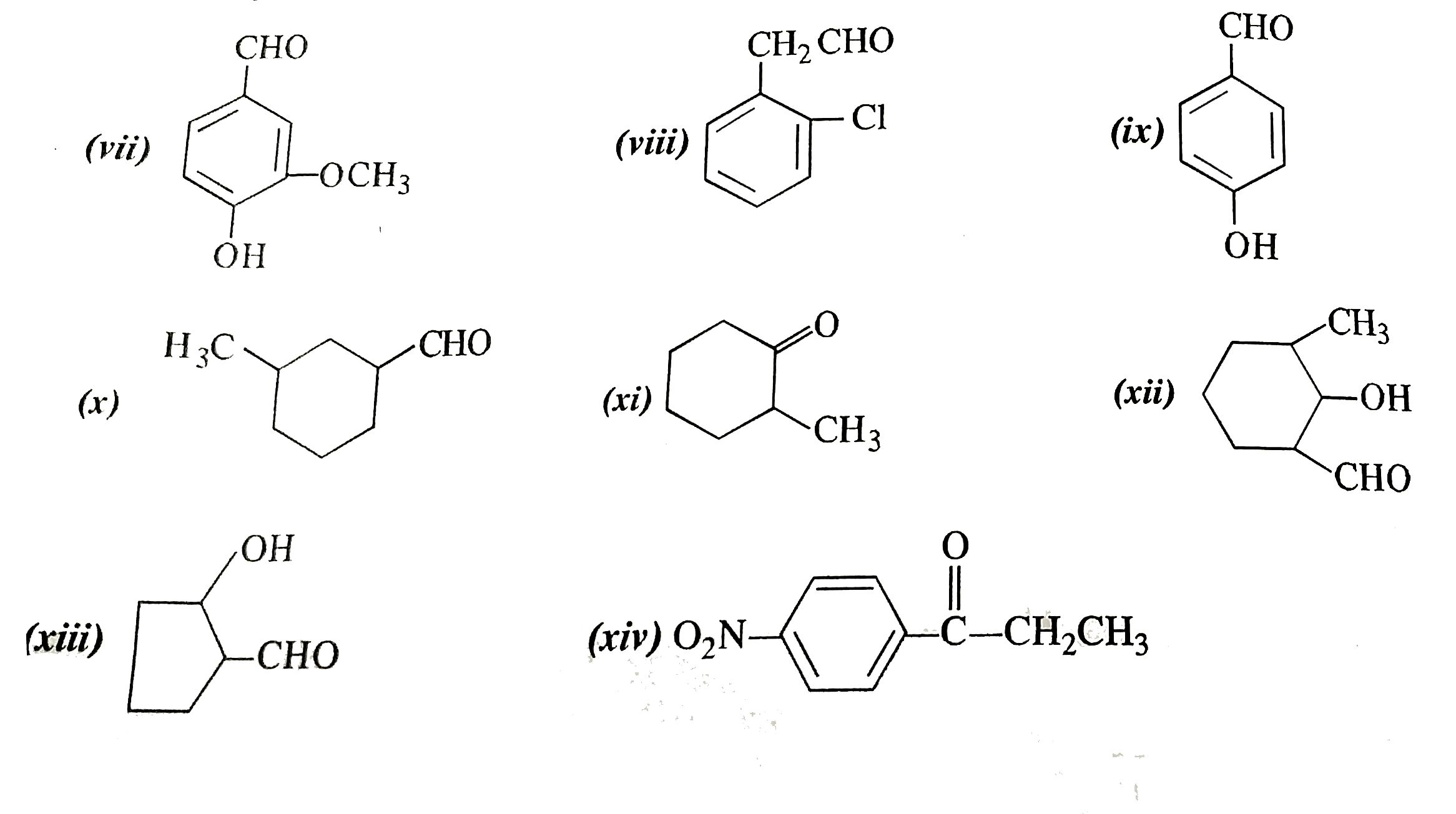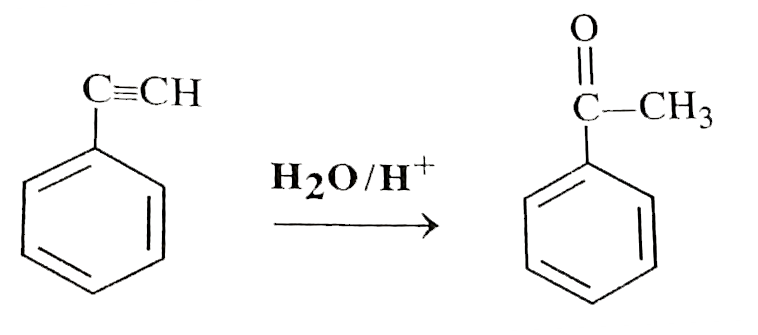Complete Solutions to Example of chapter ALDEHYDES AND KETONES of Class 12 book with complete answers and questions
| Class 12 | CHEMISTRY |
| Chapter | ALDEHYDES AND KETONES |
| DINESH COMPANION CHEMISTRY | Example |
| Number Of Questions | 14 |
| Academic Year | 2023-24 |
Write the structure of an isomeric aldehydes and ketones with the molecular formula `C_(5)H_(10)O`. Give their `IUPAC` names.
View SolutionDraw the structure of the following :
(i) 3-Methylbutanal , (ii) p-Methoxybenzaldehyde , (iii) 4-Chloropentan-2-one
(iv) p,p-Dihydroxybenzophenone, (v) p-Nitropropiophenone , (vi) 4-Methylpent-3-en-2-one,
View SolutionGive the IUPAC name of the following compounds:
(i) `(CH_(3))_(2)` , (ii) `CH_(3)COCH(CH_(3))_(2)`, (iii) `Cl_(2)CHCOCH_(3)`
(iv) `CH_(3)CH(OH)CH_(2)CHO` , (v) `C_(6)H_(5)CH_(2)CHO` , (vi) `CH_(2)=CHCOCH =CH_(2)`

View SolutionGive names of the reagents to bring about the following transformations:
(i) Hexan-1-ol to hexanal
(ii) Cyclohexanol to cyclohexanone
(iii) p-Fluorotoluene to
(iv) Ethanenitrile to ethanal p-fluorobenzaldehyde
(v) Allyl alcohol to propenal
(vi) But-2-ene to ethanal
View SolutionComplete the following

View SolutionHow will you convert `Ph-C-=ChrarrPh-overset(O)overset(||)C-CH_(3)`?
View SolutionComplete the following conversion.

View SolutionYou are provided with following four reagents: `I_(2)//NaOH, NaHSO_(3),LiAH_(4)` Schiff's reagent. Write which two reagent. Write which two reagents can be used to distinguish between the compounds in each of the following pairs :
(i) `CH_(3)CHO` and `CH_(3)COCH_(3)` , (ii) `CH_(3)CHO` and `C_(6)H_(5)CHO`
(iii) `C_(6)H_(5)COCH_(3)` and `C_(6)H_(5)COC_(6)H_(5)`
View SolutionWrite the various steps involved in the following conversion :
`CH_(3)-underset(CH_(3))underset(|)CH-CH_(2)-CH_(2)-OHrarrCH_(3)-underset(CH_(3))underset(|)CH-CHO`
View Solution0.44g of a monohydric alcohol when added to `CH_(3)MgI` in ether librates at STP, 112`cm^(3)` of methane. With PCC the same alcohol forms a carbonyl compound that answer silver mirror test. The monohydric alcohol is `:`
View SolutionSuggest a suitable way to synthesise the following with the help of aldol condensation
(i) 4-Phenylbutan-2-ol , (ii) 3-Phenylpropan-1-ol
View SolutionAn organic compound [A] with molecular formula `C_(9)H_(10)O` forms an arage-red precipitate [B] with `2,4` DNP reagent. Compound [A] gives yellow precipiatate [C] on heating wihth iodine in the presence of soedium hydroxide along with a colourless compound [D]. The compound [A] does not reduce Tollen's reagent or Fehling's solution nor does it decolourise bromine water or Baeyer's reagent. On drastic oxidation with chromic acid, compound [A] gives a crboxylic acid [E] having molecular formula `C_(7)H_(6)O_(2)`. Deduce the strcutres of the organic compounds [A] to [E].
View SolutionWrite the structure of A, B, C, D and E in the following reactions :

View SolutionAn organic compound (A) with molecular formula `C_(8)H_(8)O` forms an orange-red precipitate with 2,4-DNP reagent and gives yellow precipitate on heating with iodine in the presence of sodium hydroxide. It neither reduces Tollens’ or Fehlings’ reagent, nor does it decolourise bromine water or Baeyer’s reagent. On drastic oxidation with chromic acid, it gives a carboxylic acid (B) having molecular formula `C_(7)H_(6)O_(2)`. Identify the compounds (A) and (B) and explain the reactions involved.
View Solution
Example questions and complete solutions for chapter ALDEHYDES AND KETONES of S DINESH & CO CHEMISTRY (HINGLISH) of Class 12
All Exercises from DINESH COMPANION CHEMISTRY Class 12 CHEMISTRY ALDEHYDES AND KETONES
- Additional Important Question
- Asseration-Reason Type Question
- Completion Of The Missing Links
- Completion Reactions
- Comprehension 2
- Comprehension 3
- Comprehension 4
- Comprehension 5
- Comprehension 6
- Comprehension 7
- Comprehension I
- Example
- Higher Order Thinking Skills
- Interger
- Match the coloumn
- Multiple Choice
- Nomenclature and Isoerism
- Practice Test
- Preparation of Carbonyl
- Problem
- Properties of Carbon
- Question From Board
- Select the correct answer
- Some Typical Conversions